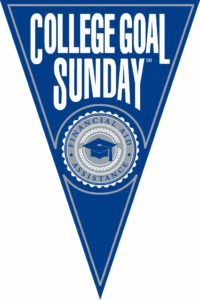 Overwhelming is a good way to describe what it’s like to send your child off to college. Maybe you’re sad (or happy, no judgement) to have them out of the nest and discovering their first taste of independence. Aside from hoping they go to class and get an education that can set them up for a bright future, there are dorms to furnish and long-term decisions to make.
Overwhelming is a good way to describe what it’s like to send your child off to college. Maybe you’re sad (or happy, no judgement) to have them out of the nest and discovering their first taste of independence. Aside from hoping they go to class and get an education that can set them up for a bright future, there are dorms to furnish and long-term decisions to make.
And all of that doesn’t include one of the most stressful aspects: how to pay for college.
One way to alleviate the stress of sorting through the financial aid process is by attending College Goal Sunday on November 5. Financial aid professionals will volunteer at 39 locations around the state to help students and families fill out the Free Application for Federal Student Aid (FAFSA). The document is required for students at most colleges and universities to be eligible for grants, scholarships and student loans.
While the FAFSA process can seem daunting or time consuming, students and families can fill out and file the form online in one afternoon with the help of professionals standing by.
College Goal Sunday is run by the Indiana Student Financial Aid Association (IFSAA) and is adding this November event in addition to its annual College Goal Sunday in February.
Interested? Here’s what you should bring:
- Students should attend with parents or guardians (unless students are age 24 or older)
- Parents should bring completed 2016 IRS 1040 tax returns, W-2 forms and other 2016 income and benefits information
- Students who worked the previous year should bring their income information
- Students age 24 and older should bring their own completed 2016 IRS 1040 tax return, W-2 Form or other 2016 income and benefits information
- Students and parents are encouraged to apply for U.S. Department of Education FSA IDs at ed.gov before attending the event
A complete list of sites is available at CollegeGoalSunday.org. All sites will have online capabilities and many will offer Spanish language interpreters. Students who attend and fill out a completed evaluation will also be entered to win one of five $1,000 scholarships.

 Here at the Chamber, we like to spend our days delving in theory (and by "we," I mean people who possess a greater cognitive capacity than I do). And this concept of human capital and student loans struck some of us as intriguing.
Here at the Chamber, we like to spend our days delving in theory (and by "we," I mean people who possess a greater cognitive capacity than I do). And this concept of human capital and student loans struck some of us as intriguing.